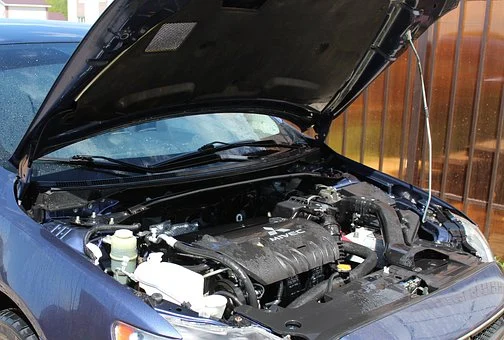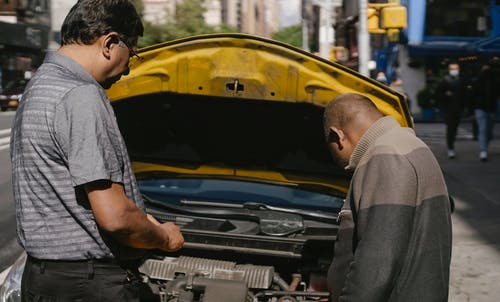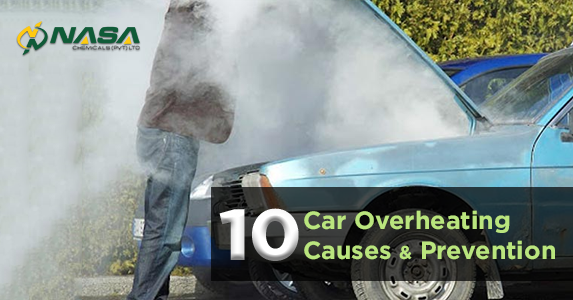We all have seen multiple forms of dreams or nightmares in our lives, which can be disturbing at times, but do you know what a daymare is?
Car Overheating!
Yes! Nothing is worst than discovering that the temperature of your car engine is increasing. (or car engine overheating)
You know it’s summer, the sun is everywhere sending its high-temperature effect, most of us make picnic plans in this weather. But what will happen if you face car engine overheating problems during your picnic or journey?
Trust us! it will become a headache :-/
That is why we are here to explain causes & car engine overheating solutions to save you from ruining your plans.

Car Overheating Causes
The main causes of car overheating are:
1. Car Overheating Due To Leakage
One of the main car engine overheating causes is leaking. Leaking can occur in any part of your cars, such as in the radiator, engine coolant system, water siphon, and different things.
These all are the signs and leak causes that would result in overheating your car engine.
If you suspect that it is the same case for you, don’t wait further and consult a car specialist near you. Solve these issues as soon as possible; further delay will result in additional damage.
Leaking in different parts of your car gives rise to various problems related to your car coolant systems.
2. Damaged Water Pump
The water pump works as a key driving power behind the coolant system to make it work smoothly. It pulls coolant from the radiator and pushes into components such as engine block or others in most cars.
Damaged or broken water pumps can also cause overheating in your car engine.
If the water pump doesn’t work, it represents that the coolant may not flow.
That’s why in case of any irregularities with the water pump, engine overheating can occur.
3. Car Engine Oil
The primary function of an engine oil is:
To lubricate the moving engine parts for smooth operation
To maintain the overall temperature by removing the heat from the engine to prevent engine overheating.
Therefore, check the oil level and quality of your engine oil regularly because it eliminates extra heat from the engine and tends to minimize the likelihood of engine overheating.
4. Blocked Or Repairable Hoses:
Sometimes the hoses that help to circulate the coolant throughout the engine can be blocked.
Even if the blockage is small, it can stop or prevents the coolant from circulating all around the engine, automatically will result in overheating.
Aside from the blocked ones, loose, clogged, or broken hoses also cause difficulty for coolant to flow either by blocking or leaking the coolant liquid.
Therefore, if you find ruptured hoses surrounding your car engine, try to repair it or replace it with another one to avoid the engine overheating.
5. Damaged Radiator
Car radiator maintenance is very compulsory because the radiator itself is the place where the coolant liquid goes to change its temperature back.
It means that a coolant can not perform its job properly without a radiator.
But if the radiator has suffered some damage, then the coolant will remain hot or too warm.
Sometimes the issue is the radiator fan or radiator itself that can burn due to some problem or accident. It becomes non-viable to cool the coolant if the radiator fluid pressure is too low or almost none.
The damaged or broken radiator causes the temperature gauge to move towards the hot size and causes overheating in your car or vehicle.
6. Not Enough Coolant
These above points are not the only car overheating causes.
Not having enough coolant in your car causes a high temperature and overheating. If you keep driving without a sufficient amount of coolant, it can cause a cooling system failure. This failure can automatically bring irregularities in your car engine such as overheating, engine ports failure, etc.
Another factor related to overheating is that if there is no leak and your vehicle contains enough coolant.
7. Use Of New Coolant
The usage of good quality & reliable coolant also makes your car engine cool. Sometimes there is no leak or fault in your engine components, but your car engine shows overheating. The reason can be the use of bad quality coolant or a new coolant as well.
Yes, quality matters a lot!
The quality of coolant fluids ranges from low to high, so always try to choose standard quality products and chemicals for your car to get better performance.
8. Malfunctioning Thermostat
Here comes the factor related to the car thermostat.
You might already know about the purpose of a thermostat because it is usually in our homes in refrigerators, irons, and many more appliances.
Regulating the car temperature is the function of the thermostat.
If the thermostat is broken or jammed, it will not control the coolant flow, which leads to engine overheating.
Other Car Overheating Problems Causes
Some of the problems or issues that can cause your engine overheating are:
9. Improper or zero maintenance of your car such as fluid changing, engine oil, & especially coolant cause overheating factors.
10. Trash, such as plastic bags and other dirt parts, can get trapped in the front grill of a vehicle, preventing air from passing through the radiator. This blockage causes hot air in the radiator that results in car overheating as well.

How To Prevent Your Car From Overheating?
Car Overheating Preventions!
Here are some of the precautions and care that can help you avoid the situation of overheating car or vehicle
Make sure to check the coolant level of your car regularly. Use a coolant from known sources because sometimes a new or different coolant can also cause issues with your car engine.
Always take an extra bottle of coolant or antifreeze in your vehicle to avoid the worst scenarios.
If the weather is too hot, try not to overuse the air conditioner, especially if you are stuck in heavy traffic.
Always try to clean the condenser before driving because it lets air pass through the radiator. And if your vehicle cooling system is working well, it avoids conditions like overheating.
Make sure to check the color & consistency of the engine oil more often and change it whenever you feel the need or consult a car specialist.
Whenever you are going for the drive, always try to keep a check on the temperature gauge. If the temperature is hot, take measures to avoid damage and overheating.
Before driving your car make sure to check if the radiator cap is tight or not because if it is not fastened it can affect your engine performance.

What to do if your car overheats? Or
How to fix an overheating car?
The most common measures to attempt when you are already facing car overheating are as follows:
Do not try to open the front hood of your car immediately. Let it cool for some time, then open it.
Stop driving when your engine starts overheating. Driving is not a suitable option because it can drag you into a more serious situation. Stop your vehicle wherever you find space or shelter.
Make sure to turn off the air conditioner.
Open your car windows for cross ventilation.
Do not try to remove the radiator cap if your engine is still hot. You can suffer burns on your body.
You can try to cool it by flushing the cooling system because coolant needs to be flushed timely to reduce. The second option is to add more coolant while your car is not heated anymore.
Conclusion:
Overheating is one of the most common car issues, which can occur for a variety of reasons. Leaking of coolant fluid, damaged belts & hoses, low antifreeze liquid, damaged radiator, malfunctioning thermostat, and others are reasons that can cause overheating in your car or vehicle. It can happen at any time and in any location, but you can avoid these problems by taking precautions such as filling up coolant, testing the temperature scale, and so on. Do not hesitate to get help from vehicle specialists in case of a serious situation because the bigger the problem is, the more you are at risk.


Comment (0)